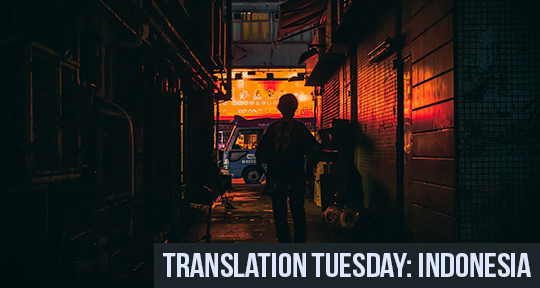This Translation Tuesday, our story takes place in a makeshift warung pangkon—a lap café—where the young Mita waitresses for her male customers in Kalibata, Jakarta. Dalih Sembiring, while better known for his translation of Indonesian novelist Eka Kurniawan’s Man Tiger, proves himself a beguiling storyteller in Nana’s mesmerising translation. First published in the 2010 queer anthology Orang Macam Kita (People Like Us), “Pangkon” is a moving story of work and the affinities between women.
She was nine years old, then. She brought home a packet of sweet condensed milk freely supplied by the school, which she mixed with a glass of warm water and later added a small spoon of coffee. No one else was at home, but she was cautious. Bapak could suddenly appear and scold her. Bapak said, coffee is for older people—for adults.
But how different the taste and aroma of milk mixed in coffee ground with green beans, she thought. She was nine years old, then. Yet to understand why some things are okay to do, and others not. It was not in her nature to question for reason. It was enough that she knew what was pleasurable was pleasurable, and what was not remained to be rejected. That is why she gets confused, now, at how blurry the lines that divide the right, the wrong, and the plain disgusting are.
“Where’s my bloody coffee, Cak!” shouts Bang Uwi to Cak Par, who is busy juggling his jars of coffee and sugar.
“Wait, one second!” Cak Pardi’s voice booms. “Who will it be tonight?”
“Mita will do, Cak. She’s like a drug.”
Bang Uwi’s words automatically invite laughter from all the men here.
The sound of rain on the roofs seems to compete with the increasingly loud chattering and cackling, and the loudspeakers drone a D’lloyd song from the VCD player. The rhythm of steel tires upon train tracks can sometimes be heard from outside. The chilly air coaxes the women on laps to press closer upon the bodies of their customers. Kretek smoke congregates thickly in the room as a sign: the night is still young. READ MORE…

